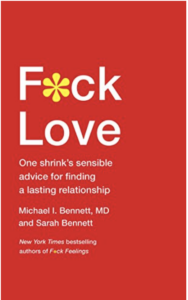
Many people have opinions on the subject of romantic relationships—why they’re so hard to find, so difficult to maintain, so easily analogized to planets and pets—but the real source of trouble isn’t too complicated: it’s that we are choosing our partners based on love, excitement, lust, attraction, neediness…on feelings.
Instead of helping readers find true love (also known as “total bullshit”), Dr. Michael Bennett and his comedy-writing daughter Sarah reveal the practical, commonsense criteria for good partnerships that will allow real love to develop, even after the romance has died down or been buried completely. Finding a good partner involves losing preconceived notions about who your dream date might be, so the Bennetts helpfully appraise the pros and cons of eight traits people most commonly seek: charisma, beauty, chemistry, communication, sense of humor, family stability, intelligence, and wealth. They suggest you’ll have better luck finding a partner in a bar, online, or on a date arranged by your chiropractor if you focus on ideas like mutual attraction and respect and common interests and common goals. With helpful quizzes, case studies inspired by Dr. Bennett’s practice, and unscientific flow charts, F*ck Love is packed with enough advice and wisdom to help you avoid the relationship nightmares that led you to this book in the first place.
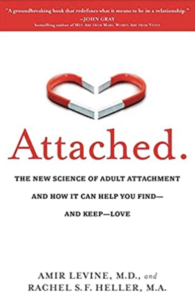
We already rely on science to tell us what to eat, when to exercise, and how long to sleep. Why not use science to help us improve our relationships? In this revolutionary book, psychiatrist and neuroscientist Dr. Amir Levine and Rachel Heller scientifically explain why why some people seem to navigate relationships effortlessly, while others struggle.
Discover how an understanding of adult attachment—the most advanced relationship science in existence today—can help us find and sustain love. Pioneered by psychologist John Bowlby in the 1950s, the field of attachment posits that each of us behaves in relationships in one of three distinct ways:
• Anxious people are often preoccupied with their relationships and tend to worry about their partner’s ability to love them back
• Avoidant people equate intimacy with a loss of independence and constantly try to minimize closeness.
• Secure people feel comfortable with intimacy and are usually warm and loving.
Attached guides readers in determining what attachment style they and their mate (or potential mate) follow, offering a road map for building stronger, more fulfilling connections with the people they love.
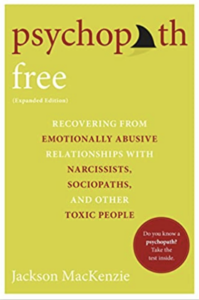
The psychopath carefully selects the most indifferent and heartbreaking way imaginable to abandon you. They destroy you as a way to reassure themselves. But most importantly, they destroy you because they hate you. They despise your empathy and love, and to destroy you is to temporarily silence the nagging reminder of the emptiness that consumes their soul. Unbeknownst to both of you, this is the beginning of a great adventure….
Psychopath Free operates under the assumption that you are not defined by your pain, but instead by the subsequent choices you make along the way. The goal is to make the process a bit more holistic, to provide all the tools you’ll need to find validation, self-respect, peace, and love. Psychopath Free will help you out of the darkness so that you can begin making better choices that will forever alter the course of your life.
So say farewell to love triangles, cryptic letters, self-doubt, and manufactured anxiety. You are no longer a pawn in the mind games of a psychopath. You are free.
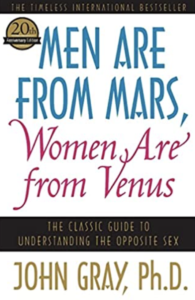
Once upon a time Martians and Venusians met, fell in love, and had happy relationships together because they respected and accepted their differences. Then they came to Earth and amnesia set in: they forgot they were from different planets.
Based on years of successful counseling of couples and individuals, Men Are from Mars, Women Are from Venus has helped millions of couples transform their relationships. Now viewed as a modern classic, this timeless book has helped men and women realize how different they can be in their communication styles, their emotional needs, and their modes of behavior, and offers the secrets of communicating without conflicts, allowing couples to give intimacy every chance to grow.
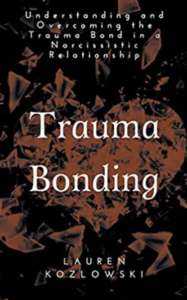
‘If your relationship is so bad, why don’t you just leave them?’
‘If you were in such an abusive relationship, why did you stay with them for so long?’
‘If you knew you were in a relationship with such a toxic person, why didn’t you ask people for help?’
If you’ve ever been asked these questions, aside from being ignorant and hurtful, you’ll know it’s beyond frustrating. The answer to the above questions, whilst it’s complex and often confusing, can be given with two words: trauma bonded.
If you find you’re in a relationship that you know is so toxic that it’s crushing your very being, but you can’t bring yourself to leave, you may be in the clutches of a tight trauma bond. If you’re constantly feeling on edge, forever working to appease your spouse to little avail and like you’re constantly being chipped away at with their abusive behavior, then I can understand how emotionally shattering it feels to live this way.
If, in the same breath, it breaks your heart to even consider leaving them because you can’t imagine life without them, then I can understand that feeling too; because I was trauma bonded to my abusive ex.
From my own personal experience and from the experiences other survivors have opened up to me about, this book will cover the following:
– What trauma bonding really is
– The 7 stages that lead to you becoming trauma bonded
– The parallels that Stockholm syndrome has with trauma bonding
– The 5 stages you go through when you come to accept you’re trauma bonded
– The cognitive dissonance a trauma bond can cause
– Breaking free from the traumatic bond
This book will also include my own experiences and I’ll draw upon those to help you really understand trauma bonding, and let you know that you’re not alone in being shackled by this emotionally crippling bond. More importantly, this book will help you understand that the invisible chain that tethers you to your abuser can be broken.